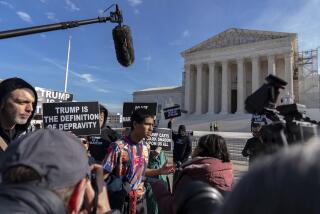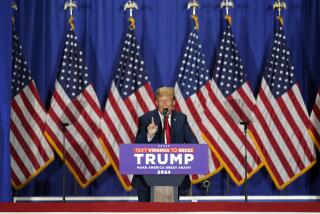Opinion: A federal court’s message to President Trump: Shut up!
“I wish Donald Trump would just shut up!”
It’s a sentiment shared by a lot of Americans, especially those who follow the president on Twitter. But on Thursday this understandable sentiment was dressed up as a conclusion of law by a federal appeals court.
In concluding that the third iteration of the Trump administration’s so-called travel ban was likely a violation of the 1st Amendment’s ban on an “establishment of religion,” the U.S. 4th Circuit Court of Appeals in Richmond, Va., paid a lot of attention — too much attention, I suspect the Supreme Court will ultimately decide — to what Trump said.
Writing for the court, Chief Judge Roger L. Gregory brushed aside the U.S. Justice Department’s argument that the presidential proclamation was “facially legitimate and bona fide” and based on security concerns. Nor did it matter that the eight countries covered by the order included two — North Korea and Venezuela — that are not majority-Muslim.
What was important, the court said, was what Trump said, as both a candidate and as president, going back to his infamous proposal during the campaign for “a total and complete shutdown of Muslims entering the United States.”
Never mind that his original travel restrictions were twice revised. Trump gave the game away, the court said, by publicly expressing a desire to return to “the original travel ban” rather than “the watered down, politically correct version.” Gregory even faulted Trump for repeating the (apparently apocryphal) story about how Gen. John Pershing warded off attacks by Muslim insurgents in the Philippines by dipping bullets in pig’s blood.
These and other statements, Gregory said, “convey the primary purpose of the proclamation — to exclude Muslims from the United States.” Oddly, Gregory hinted that Trump might have been able to redeem himself and the travel ban in the eyes of the court by shutting up: “President Trump could have removed the taint of his prior troubling statements; for a start he could have ceased publicly disparaging Muslims.”
I don’t support Trump’s travel ban in any of its iterations, and it was outrageous that he proposed during the campaign to block all Muslims from entering the country. But there are problems with the way the 4th Circuit has analyzed this case — problems that make it unlikely that the Supreme Court will see things the same way.
First, the appeals court seemed to assume that Trump’s original proposal for a “total shutdown” was animated by religious animus. It’s more likely, as I wrote last year, that “Trump was engaging in what lawyers would call over-inclusive thinking: The terrorists he was concerned about were Muslims, so he decided to ‘err on the safe side’ and ban all Muslims. It was an idiotic as well an offensive impulse. After smarter people pointed that out to him, he backed down and adopted a more targeted strategy.”
The second problem with the 4th Circuit’s legal test is that, by focusing on what Trump says on the stump — and on Twitter — it puts the courts in the role of perpetually policing what a president says as well as the content of formal executive orders. As much as we may enjoy seeing Trump get comeuppance for shooting off his mouth, the idea of courts judging the constitutionality of official actions based on a president’s latest stump speech or tweet is problematic.
Last December, the San Francisco-based U.S. 9th Circuit Court of Appeals also ruled against Trump’s travel ban — but on the narrower grounds that in promulgating it Trump exceeded the scope of the authority delegated to him by Congress. Better for the ban to be struck down for that reason than because of the latest crazy thing to come out of our peculiar president’s mouth.
Follow the Opinion section on Twitter @latimesopinion and Facebook
More to Read
A cure for the common opinion
Get thought-provoking perspectives with our weekly newsletter.
You may occasionally receive promotional content from the Los Angeles Times.







